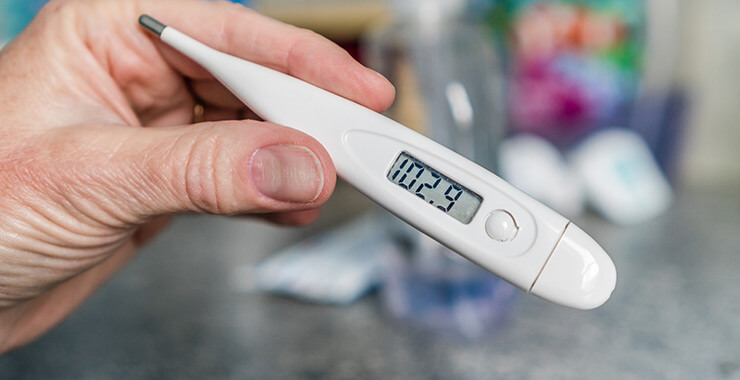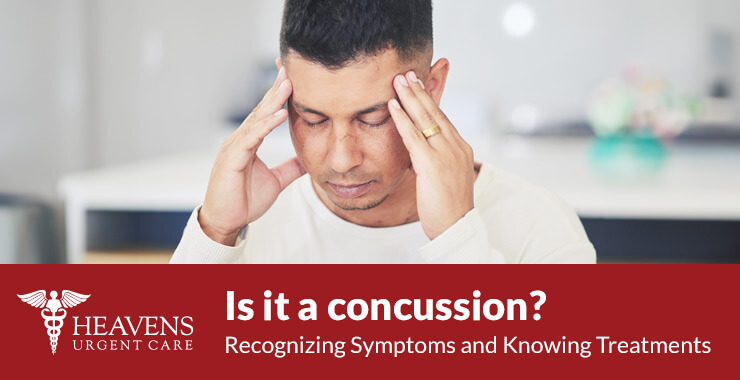Fever, pain when swallowing, and red, swollen tonsils are usually a sign that you have strep throat.
Strep throat, caused by the bacterial infection Streptococcus Pyogenes, is a common throat infection that is easily transmitted through respiratory droplets, leading to the widespread occurrence of this infection that adversely affects thousands of people every year.
Most of the time symptoms are often mild, but this type of bacterial infection is very contagious.
Strep throat is most commonly found in children from ages 5 and 15, although anyone can come down with it.
We are often asked at Heavens Urgent Care if it is necessary to take an antibiotic for strep throat. The answer will not surprise you.
Strep Throat Symptoms
Strep throat typically presents with a variety of symptoms that can be challenging to identify. We’ve mentioned a few of the common symptoms of Strep throat, but let’s review them in more detail and add a few others.
- Sore Throat: Severe throat pain is a hallmark symptom of strep throat. The discomfort can make swallowing difficult.
- Red Tonsils: The tonsils become swollen, red, and might develop white or yellow patches.
- Painful Swallowing: Due to the inflammation, swallowing food or liquids can become painful and uncomfortable.
- Fever: A high-grade fever, usually over 101°F (38.3°C), is a common indication of strep throat.
- Tonsillar Abscess: In some cases, a tonsillar abscess may develop, causing severe pain, difficulty in breathing, and the potential need for immediate medical attention.
- Patients also report headaches, queasiness, and chills.
Symptoms may be mild or severe but often appear 2 to 5 days after someone comes in contact with the strep germ.
Challenges of Managing Strep Throat
There are two associated challenges of managing Strep throat:
- The symptoms of strep throat often mimic those of viral infections or other throat-related illnesses, leading to misdiagnosis. In fact, most people get sore throats from a viral infection, in other words, the common cold. That’s why it is essential to consult a healthcare professional for a proper diagnosis.
- Strep throat is highly contagious, especially during the first 2-3 weeks from the onset of the illness. Practicing good hygiene and avoiding close contact with infected individuals can help contain the spread of this infection.
Exams and Testing For Strep Throat
Because the chances of a misdiagnosis are present, and many other causes of a sore throat have the same symptoms, your healthcare provider must do a rapid strep test to diagnose strep throat and decide whether to prescribe antibiotics.
A rapid strep test may produce a negative reading, even if strep is present. If the rapid strep test is negative, and your medical provider still suspects that the strep bacteria is the cause of the sore throat, a throat swab can be tested and cultured to see if strep bacteria grow from it. Results will take 1 to 2 days.
What About Those Antibiotics?
Let’s look at all the treatment options. First, is the answer to the question: Do I need to take antibiotics to treat Strep throat?
The short answer is, yes.
Strep is primarily treated with antibiotics like penicillin or amoxicillin to eradicate the bacterial infection. The same germ that causes strep throat may also cause symptoms of a sinus infection or an ear infection.

Strep Throat Studies with Antibiotics
There are numerous scientific studies supporting the effectiveness of antibiotics in the treatment of strep throat.
- Shaikh, N., et al. “Clinical cure rates in pediatric group A streptococcal pharyngitis with amoxicillin versus penicillin: a systematic review and meta-analysis.” Clinical Pediatrics 56.3 (2017): 215-224. This meta-analysis demonstrated that both amoxicillin and penicillin are highly effective in curing pediatric group A streptococcal pharyngitis. It indicated that antibiotics are crucial in achieving complete resolution of strep throat symptoms.
- McIsaac, W. J., et al. “Empirical validation of guidelines for the management of pharyngitis in children and adults.” JAMA 291.13 (2004): 1587-1595.The findings of this study emphasized the significance of antibiotic therapy in strep throat management. It demonstrated that adhering to recommended treatment guidelines, including the use of antibiotics when necessary, contributed to improved patient outcomes and reduced complications.
- Centor, R. M., et al. “The diagnosis of strep throat in adults in the emergency room.” Medical Decision Making 21.6 (2001): 506-514. This study highlighted the successful use of antibiotics in the emergency room for treating adults with strep throat. The prompt administration of antibiotics played a crucial role in alleviating symptoms and preventing potential complications associated with this bacterial infection.
- Shulman, S. T., et al. “Clinical practice guideline for the diagnosis and management of group A streptococcal pharyngitis: 2012 update by the Infectious Diseases Society of America.” Clinical Infectious Diseases 55.10 (2012): e86-e102. The Infectious Diseases Society of America guidelines recommend antibiotic treatment for confirmed streptococcal pharyngitis cases, as it aids in reducing potential complications, minimizing transmission, and providing symptom relief.
It is important to note that while antibiotics are generally effective against strep throat, appropriate antibiotic selection, dosage, and treatment duration should be determined by healthcare professionals based on individual patient factors, antibiotic resistance patterns, and regional guidelines.
We recognize that some patients are resistant to antibiotics, or for other reasons, do not want to take them. Strep throat will typically go away in three to seven days with, or without, antibiotic treatment.
We don’t advise it, but if you are set against using antibiotics for Strep throat, you can remain contagious for two to three weeks and are at a higher risk for other complications, so it is extremely important that you consult with your medical professional before relying on this course of action.

Symptom Management
Gargling with warm salt water, drinking warm tea with honey, using throat lozenges, and staying hydrated by drinking plenty of fluids can help ease symptoms. Many patients will also keep a vaporizer or humidifier running to soothe throat dryness.
Additionally, over-the-counter pain relievers, such as acetaminophen or ibuprofen, can help alleviate discomfort and reduce fever.
Prevention of Strep Throat
To reduce the risk of contracting strep throat:
- Practice good hand hygiene by washing hands frequently with soap and water.
- Avoid close contact with infected individuals until they have been on antibiotics for at least 24 hours.
- Promote good respiratory hygiene by covering your mouth and nose when coughing or sneezing.
Some strains of strep throat can lead to a fever-like rash, known as Scarlet Fever. This rash will generally appear first on the neck and chest. From there spreading over the body in a rash that can feel like sandpaper.
Recognizing the symptoms and associated challenges of strep throat is crucial for timely intervention and appropriate treatment.
Seeking medical attention promptly, completing a prescribed antibiotic course, and practicing prevention techniques can help minimize the spread of infection.
Remember, only a qualified healthcare professional can provide an accurate diagnosis and guide you toward a successful recovery.







